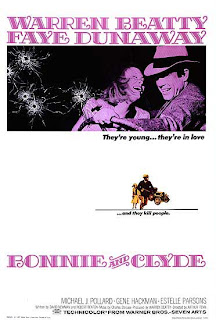 "My name is Bonnie Parker. This here is Clyde Barrow. We rob banks."
"My name is Bonnie Parker. This here is Clyde Barrow. We rob banks."Bloody, romantic, and hilarious. This sounds like I'm describing three different movies. No, no. No other movie that I can think of that's on this list so effectively blends violence with tenderness, humor with pathos, as 1967's "Bonnie and Clyde."
The film was criticized when it came out because of its gore. The brightness of the blood and the seeming glorification of murder made many people irate. And maybe the movie deserved to make people angry. Check out the final scene. Spoilers.
The term "ballet of blood" is used to describe this scene and the movie as a whole. I can think of no better way to sum up the two-hour experience than that.
The film was criticized when it came out because of its gore. The brightness of the blood and the seeming glorification of murder made many people irate. And maybe the movie deserved to make people angry. Check out the final scene. Spoilers.
The term "ballet of blood" is used to describe this scene and the movie as a whole. I can think of no better way to sum up the two-hour experience than that.
It is truly one of the best movie experiences I've had in my life.
The film is not just funny; it did not just make me smile or let out a few chuckles. I found myself laughing out loud, particularly in any scene that involved Estelle Parsons in her Oscar-winning role as the preacher's daughter Blanche Barrow or Michael J. Pollard in his Oscar-nominated role as the gas station attendant who becomes a member of a gang, C.W. Moss. These two characters embody everything the movie is about -- humor, violence, and pity.
The film, with all of its controversy, broke many of the taboos surrounding American film in the 1960s. Now, finally, under the regime of "New Hollywood," filmmakers had more liberty to show what they wanted, how they wanted.
Clyde Barrow (Warren Beatty) is an interesting case. The leader of the gang, he suffers from impotence when it comes to the young, fresh, and not-s0-pure Bonnie Parker, played by Faye Dunaway (she smokes cigars, for goodness sake). Sexual imagery and frustration is rife in this clip. But once she "tells his story," all bets are off. A psychoanalyst could do a number on all of these people, sure, but his time would probably be best spent with Mr. Clyde Barrow.
I've seen this movie several times before. But two new things I gleaned from watching it last night were: how inept the gang was at robbing banks, and how fascinating a national phenomenon this was.
The gang was downright bad at robbing banks. Sure, we see them pull off a few successful jobs, but it's never that much money. The reason these thieves were so famous was their public relations department. As depicted in the film, they would write poems and take pictures and send them into the newspapers. This made them celebrities.
They captured the nation's imagination. If a person was shot at during a bank robbery, they had their picture taken with the spot on the wall where the bullet hit. They just don't make criminals like that anymore.
Although the movie was set in the 1930s, it is hard to make a case for many other films that so well define the ways of thinking surrounding the 1960s mentality. Disillusioned about the differences between good and evil, people were looking for an anti-hero. And they found a great one in the Barrow gang. You actually resent the sheriff for enacting justice at the end, and then you realize that these were bad people. But somehow that doesn't even matter.
As I read over my review, I do not think it has done this movie justice. Watching the movie was so enjoyable from every angle, it is hard to put it into words. It is an experience that should be savored again and again, as I am sure to do in the future.









